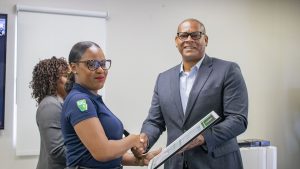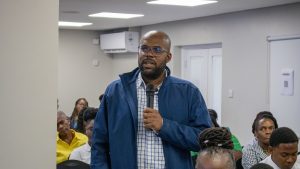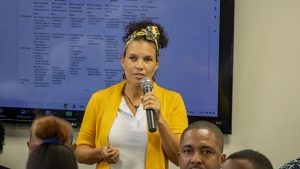OECS Media Release
Dominica’s private sector demonstrated strong support at a stakeholder engagement consultation focused on financing mechanisms for a sustainable sorting, collection, and recycling system for plastic waste. The event, organised by the Dominica Solid Waste Management Corporation (DSWMC) and the Recycle OECS Technical Consulting team, and endorsed by the Dominica Association of Industry and Commerce (DAIC), attracted an impressive turnout.
 Held under the theme “Roadmap to a Sustainable Economy,” the breakfast forum took place at the Fort Young Hotel in Dominica from 9 a.m. to noon. Notable attendees included Hon. Cozier Frederick, Dominica’s Minister for the Environment, Rural Modernisation, Kalinago Upliftment and Constituency Empowerment, and Dr. Kyra Paul, Permanent Secretary in the Ministry of Housing and Lands. Additionally, the event welcomed small contingents from educational institutions enrolled in the Zero Waste School’s program as part of the Recycle OECS Project and private sector companies that have signed on as Dedicated Recycling Partners.
Held under the theme “Roadmap to a Sustainable Economy,” the breakfast forum took place at the Fort Young Hotel in Dominica from 9 a.m. to noon. Notable attendees included Hon. Cozier Frederick, Dominica’s Minister for the Environment, Rural Modernisation, Kalinago Upliftment and Constituency Empowerment, and Dr. Kyra Paul, Permanent Secretary in the Ministry of Housing and Lands. Additionally, the event welcomed small contingents from educational institutions enrolled in the Zero Waste School’s program as part of the Recycle OECS Project and private sector companies that have signed on as Dedicated Recycling Partners.
In setting the context for the forum, Florian Mitchel, General Manager of the Dominica Solid Waste Management Corporation, emphasised the fortuitous timing for Dominica in implementing the Recycle OECS Model Demonstration Project. This aligns with the island’s commitment as a signatory to the Global Plastic Treaty, where a key element pertains to financing, capacity building, technical assistance, and technology transfer – all of which are priority areas being addressed by the Recycle OECS Model. Mr. Mitchel highlighted the importance of private sector participation in arriving at an appropriate suite of financing mechanisms, a key component necessary for ensuring a financially sustainable plastic waste management system.
 As the Recycle OECS Project places a strong emphasis on achieving sustainability, the model demonstrates three key characteristics: robust support for regional cooperation, self-financing capabilities, and replicability for other OECS Member States. This adaptability considers market trends and opportunities within each domestic context. The financing pillar of the project holds significant implications for businesses operating in the region.
As the Recycle OECS Project places a strong emphasis on achieving sustainability, the model demonstrates three key characteristics: robust support for regional cooperation, self-financing capabilities, and replicability for other OECS Member States. This adaptability considers market trends and opportunities within each domestic context. The financing pillar of the project holds significant implications for businesses operating in the region.
To shed light on the recommendations for financing, Raphael Berdugo and Valentine Lambert from the Seureca/Unite Caribbean Consortium, contracted by the OECS to design the model and provide technical advice, were present. The duo explained that governments typically employ a diverse range of financing streams, including but not limited to state-imposed levies on imports, utility costs for waste services, and deposit refund systems. They noted that for these mechanisms to be effective, they must be supported by laws and policies that clearly define responsibilities, ensuring fairness, transparent allocation of funds, and effective monitoring and evaluation.
Opening the discussion session, Dr. Kyra Paul called on the business community to commit “to tangible actions that will contribute to a greener, cleaner, more sustainable future for our city and our nation.” Dr. Paul urged the gathering to be catalysts for change.
 “When the private sector takes a stance on environmental responsibility, it influences consumer behavior,” she said, adding that “Recycling is not just a buzzword; it is a practical solution to reduce the burden on our landfills, conserve resources, and mitigate the impact of pollution on our marine ecosystems.”
“When the private sector takes a stance on environmental responsibility, it influences consumer behavior,” she said, adding that “Recycling is not just a buzzword; it is a practical solution to reduce the burden on our landfills, conserve resources, and mitigate the impact of pollution on our marine ecosystems.”
In his remarks, Hon. Cozier Frederick welcomed the value of a whole-of-society approach for the implementation of the Recycle OECS Project. The Minister acknowledged the potential of the Project to support Dominica’s ambitions as a party to the Global Plastic Treaty, which aims to end plastic pollution by 2040.
“The Ministry of Environment and, by extension, the Government and people of Dominica applaud this commitment and joint activity by the various commercial entities, schools, and other stakeholders in bringing forth this much-needed grassroots project that seeks to inculcate environmental appreciation and conservation to our future leaders,” the Minister added.
A Media Mixer followed the breakfast forum on Monday evening. The Mixer provided media managers, editors, bloggers, and other content creators with an understanding of the Recycle OECS Project within the context of the EU-CARIFORUM Partnership for cooperation in the field of the circular economy and Solid Waste Management, the OECS Blue Economy Strategy, Dominica’s Climate Resilience and Recovery Plan, and the foundational seven News Values.
About Recycle OECS
The Recycle OECS Project is funded by the European Union, in collaboration with CARIFORUM, and implemented by Agence Française de Développement (AFD) in partnership with the Organisation of East Caribbean States (OECS). The purpose of the Recycle OECS project is to undertake a comprehensive assessment of the OECS waste management sector and develop and implement a model waste separation, collection, and recycling program for the OECS that considers a regional approach, self-financing, sustainability, and business viability. Dominica and Grenada are the Member States implementing Recycle OECS Model Demonstrations Projects.
